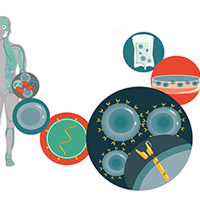Goals behind NCI’s T cell manufacturing supplement grant awards
Cell Gene Therapy Insights 2017; 3(4), 267-270.
10.18609/cgti.2017.028
The field of cancer immunotherapy is advancing rapidly and in spite of tremendous research and promising pre-clinical studies, there’s only limited clinical success. What’s your perspective on the progress being made in immuno-oncology?
The field of immune-oncology is greater than 50 years old. Significant clinical efficacy has recently been observed thus providing a ‘positive control’ for understanding the underlying mechanism of these responses in human patients. This clinical validation of the immunotherapeutic hypothesis has resulted in significant energy, enthusiasm and investment in these approaches. Therefore, great progress is being made and should continue to accelerate over the next couple of decades.
A number of studies are now in various stages of pre-clinical and clinical development for CAR-T cells. As one of the leading centers in the world for cancer research, how has NCI contributed to the translation from the laboratory into clinical trials?
The lab of Dr Steven Rosenberg at NCI, has been a pioneering lab on many of the autologous T cell approaches to treating cancer. Dr Rosenberg’s lab has not only produced seminal data in this area but has also been responsible for training a large number of the current researchers working on CAR-T cells. NCI has been funding the basic research responsible for the CAR-T cell clinical advances for the last two decades. Nearly all the top scientists in the field of CAR-T cell approaches have been awarded NCI grants to support those efforts over the last 20 years. In addition, the NCI DCTD continues to support clinical trials of investigational CAR-T cell approaches.
NCI has initiated several grant opportunities to expedite R&D of cell-based cancer immunotherapies. As Program Director for grants at NCI’s Biological Resources Branch, could you elaborate on the objectives of this initiative?
NCI has a large number of initiatives supporting immunotherapy and these can be found at this link. I can comment on two recent initiatives that are not listed there but that were championed by our branch at NCI. The Biological Resources Branch at NCI/DCTD/DTP is responsible for a portfolio of grants supporting preclinical research in immunotherapy for cancer and has oversight of a cGMP manufacturing facility for Phase 1 and Phase 2 clinical trials of biologics at the Frederick National Lab for Cancer in Frederick, MD. We have recently helped author a competitive administrative supplement opportunity and a competitive SBIR contract solicitation opportunity. Both of those grant initiatives deal with the challenges of manufacturing cell therapy products to support cancer research advances. It is exciting to see that the NCI has initiated investments in manufacturing as it is mainly focused on funding for basic and clinical research. Manufacturing of autologous T cell products like CAR-T cells currently differs greatly from lab-to-lab thus it is difficult to compare results between institutions. When manufacturing complex biologic therapies such as cell therapies, the process is the product. Therefore, different processes for harvest, selection, transduction and expansion result in different final cell therapy products. These funding opportunities are focused on manufacturing innovations that can increase capacity and reproducibility of these processes.
What are some of the areas that the grant covers and could you tell us more about the funding process?
The first initiative was an Administrative Supplement award to support improvement and optimization of T cell therapies and cGMP manufacturing processes for production of autologous T cell therapy products targeting solid cancers and it was released in May 2016.
The reason why we are interested in solid tumors is because currently there are a number of companies such as Novartis, Kite and Juno that are developing technologies like CD19-targeted CAR-T cells for hematologic cancers. We are trying to stimulate innovation and capacity improvement in manufacturing, but we also want to focus on solid cancers that currently have less investment attention clinically. Only P30 awarded NCI Cancer Centers with previous clinical experience in treating patients with T cell therapy for cancer were eligible to compete. 17 applications were reviewed and three supplements were awarded in September 2016.
The second initiative was the SBIR contract solicitation titled ‘Manufacturing Innovation for the Production of Cell-Based Cancer Immunotherapies’. It was released in October 2016 and was recently peer-reviewed at NIH. It is planned that the awards will be made near the end of fiscal year 2017 (around July–August 2017). This award is for manufacturing innovation for the production of cell-based products that includes T cells, NK cells and mesenchymal stem cells. Innovation on mesenchymal stem cells would only be considered if its molecular mechanism of action is mediated through the immune system.
What’s the long-term goal of the initiative and what outcomes do you hope to see in the next 5 years?
The long-term goals of the manufacturing funding opportunities are to stimulate innovation supporting capacity and reproducibility in cGMP cell therapy production such that multi-institutional trials can be initiated to evaluate the efficacy of these approaches in larger clinical trial settings.
It is important to get continued interest from the investment community, whether it is pharmaceuticals, biotechs or venture capitalists, to show that these products work in multi-institutional trials. Having a product that works only in one institution does not have any clinical value if the scientific approach cannot be reproduced in multi-institutional trials. One goal is to find a mechanism for NCI to support more multi-institutional trials and to achieve that, we need reproducible manufacturing capabilities. Reproducible manufacturing can be achieved using centralized manufacturing facilities, which is the current approach of the pharma/biotech industry or by development of new manufacturing systems that can generate reproducible products independent of the cancer center. An example of the latter approach would be the development of a manufacturing system that allows the user to add the patient cells, push a button and then the technology can process the cells, control the cells, do in-process testing, select cells, expand cells and end the process with an autologous product that is ready for the patients. This type of manufacturing approach would necessitate validation of the engineering systems and process systems supporting the production but could allow multiple, reproducible patient production lots to be generated in a single cGMP suite.
Affiliation
Anthony Welch
Project Officer, National Cancer Institute,
Biological Resources Branch, Developmental Therapeutics Program, Division of Cancer Therapeutics and Diagnositics.
welcha@nih.gov
This work is licensed under a Creative Commons Attribution- NonCommercial – NoDerivatives 4.0 International License.


